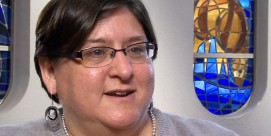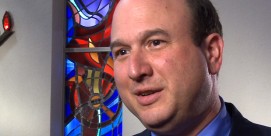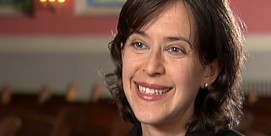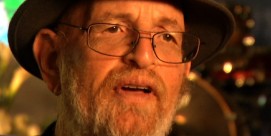RABBI MARK BOROVITZ (Author, The Holy Thief): T’Shuvah was put into the world before the world was created, according to our mystics, because God knew that we would screw up and need a way back.
Cantor/choir singing: “Return again. Return to the land of your soul…”
RABBI BOROVITZ: When I first really learned about it in prison, from Rabbi Mel Silverman, I found it exhilarating, because now I had a way. I connected to something that was 3,000 years old, so I knew it worked.
So T’Shuvah is repentance, return and new response. T’Shuvah is change. T’Shuvah says that change is possible, and change is mandatory. Our tradition teaches do T’Shuvah one day before you die and, since none of us know the day of our death, do T’Shuvah every day. Every day, I have to take a look at myself. What did I do well, and what did I do not so well?
Rabbi to congregation: “Are there any people here who have transgressed in the past year? Okay, so then we’re all the same.”
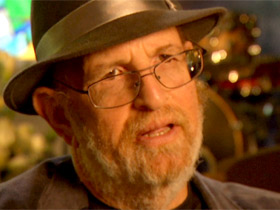 RABBI BOROVITZ: I can’t ask for T’Shuvah from God until I go to other people.
RABBI BOROVITZ: I can’t ask for T’Shuvah from God until I go to other people.
Cantor singing: Kol Nidre
RABBI BOROVITZ: Not only do I make amends, not only do I, you know, make restitution when necessary, but I speak to them about my plan on how I’m not going to do this again. And I invite them, I ask them, to help me. Some people accept it. Sometimes I have to go back more than once, but in the Jewish tradition after three times it’s on the other person.
Congregant reading: “I hereby forgive whoever has hurt me, and whoever has done me any wrong. Whether deliberately or accidentally. Whether by word or by deed.”
RABBI BOROVITZ: And then I go to God. And I do my T’Shuvah with God because any time I harm a human being, I’m also harming God.
Choir chanting: “Dear God, may we please start again? May we please come back to you? We commit to change.”
RABBI BOROVITZ: The gates of T’Shuvah are open 24 hours a day, 7 days a week, 52 weeks a year, because God wants our return. We let what happened in the past, we repair it and we let it go. It no longer rules my life. Rather, I use it to enhance my life.
Rabbi to congregation: “The tradition says that if you hold the Torah close to you, the letters go through the parchment, and they form on your heart. And then they come into your heart and they make the right words, the words that your soul needs this year.”
RABBI BOROVITZ: Religion is here to help us grow, to give us the answer to those questions that say, “What’s it all about? What does God want from me? What did life get out of me today?” And T’Shuvah allows me to suit up every day and give life the best I can. And I meet God on Kol Nidre and Yom Kippur, and I recovenant with God. And it’s like a marriage.
Cantor singing.
RABBI BOROVITZ: So when you’re involved in T’Shuvah, all of a sudden this becomes the greatest day. It’s a celebration. And the prayers are all meant to do that. A lot of people look at it as if it’s a very solemn, heavy—no.
Cantor/choir singing.
RABBI BOROVITZ: After this recovenanting, I am so energized, so excited, so ecstatic that what I get is hope. What I want for my community is that they have hope and vision, and passion and purpose for how life is going to be just that much better in this coming year.

 RABBI BOROVITZ: I can’t ask for T’Shuvah from God until I go to other people.
RABBI BOROVITZ: I can’t ask for T’Shuvah from God until I go to other people.
